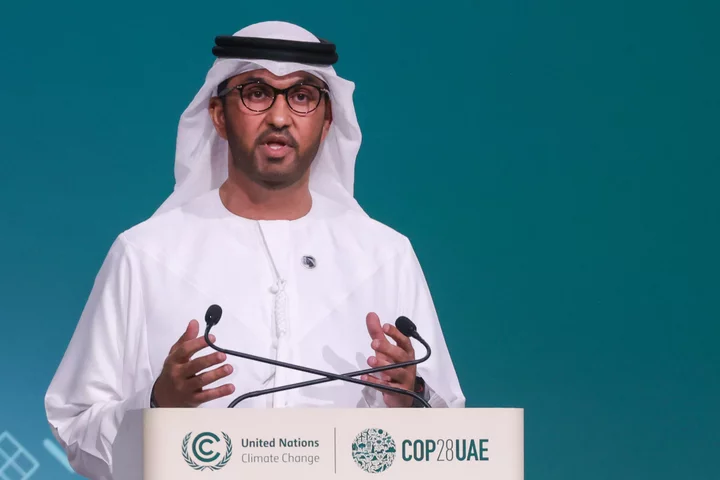Sign up for the Green Daily newsletter for comprehensive coverage of the climate summit right in your inbox.
Exxon Mobil Corp. and Saudi Arabia’s Aramco, the world’s largest private and state-sector oil companies, led a pledge by 50 oil and gas producers at the COP28 climate summit to cut emissions from their own operations.
The deal will be controversial given none of the companies are agreeing to reduce oil and gas production. But they will pledge to stem releases of methane, one of the most dangerous greenhouse gases, to near zero by 2030 and stop routine flaring of natural gas.
COP28 President Sultan Al Jaber, who’s also chief executive officer of the Abu Dhabi National Oil Co., has staked a lot of political capital on bringing the oil and gas industry into the climate fight.
The 50 members of the Oil and Gas Decarbonization Charter account for about 40% of global oil production. They include 29 national oil companies, marking progress in a sector that’s been slow to act on methane given a lack of pressure from regulators and investors. The targets won’t be binding, but signatories will have to submit a plan to meet them by 2025.
Read More: Companies Push Back on Science Showing Their Methane Pollution
Among international oil companies, Shell Plc, BP Plc, TotalEnergies SE and Occidental Petroleum Corp. joined Exxon in signing. The most notable absences were Chevron Corp. and ConocoPhillips.
The list of national oil companies includes Brazil’s Petrobras, Nigeria’s NNPC and Kazakhstan’s KazMunaiGaz. China’s largest oil and gas companies haven’t joined up.
“The launch of the OGDC is a great first step,” Al Jaber said in a statement. “We need the entire industry to keep 1.5C within reach and set even stronger ambition for decarbonization.”
The announcement is part of a broader package called the Global Decarbonization Accelerator that includes a pledge to triple global renewables deployment by 2030 and plans to tackle pollution for heavy industry.
Strong Reactions
To many activists at COP, Exxon and Aramco are little more than climate criminals, bearing much of the responsibility for the crisis of global warming. Al Jaber argues that even as fossil fuels are phased out, oil and gas will remain part of the energy system for decades to come and making them as clean as possible helps the cause.
More than 300 climate organizations from across the world published a letter strongly criticizing the pledge. It urged the COP28 presidency to drop the initiative and instead focus on securing a legally binding package to phase out all fossil fuels.
“We don’t have time to waste with more pledges and initiatives with fancy names,” said Cansin Leylim Ilgaz, associate director of global campaigns at 350.org, a movement seeking to end the use of dirty fuels. “We need a fast, fair, and equitable fossil fuel phase out that does not rely on dangerous distractions.”
Darren Woods, the CEO of Exxon Mobil, was among industry bosses who traveled to COP to sign the charter, the first time the leader of America’s largest oil company has appeared at a global climate summit.
“The good news is, with this COP there is the desire to try to bring all the constituents together to try to solve this hard, challenging problem,” Woods said in an interview.
Exxon has long resisted targets that would require it to cut production even as rivals such as Britain’s BP and France’s TotalEnergies have sought to align their business plans with global climate goals.
This plan is more palatable to the likes of Exxon and Aramco because it says nothing about how fast global oil and gas production should fall. Both companies have said that oil and gas will remain vital to the global economy for the foreseeable future.
The signatories will also commit to almost zeroing out carbon pollution from their operations, known as scope 1 or 2 emissions, by 2050. That sounds radical, but it entirely excludes scope 3 emissions, which come from burning the fossil fuels they produce and make up the vast majority of their climate damage.
Author: Will Kennedy and Jennifer A. Dlouhy

